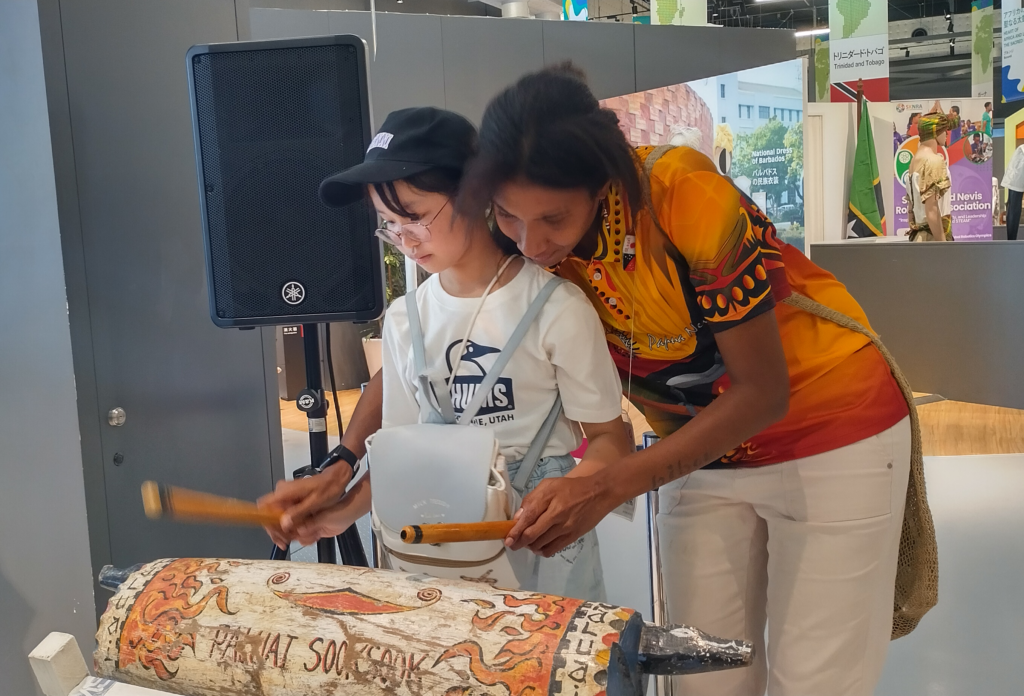WHEN they went to perform at the Osaka World Expo 2025 last month, the Paluai Sooksook group was carrying an unwanted load on their shoulders – criticism from some Manus people about allowing females to play the garamut.
Group leader Lungol Popeu was disappointed because all they wanted to do was showcase to the world their culture – through their sisters and daughters.
“It felt like a huge weight on our shoulders but we had to bear it and give our best performance at the World Expo in Japan for the sake of our country.
“We did not expect the community to react this way because there is no universal style of playing the garamut at home. Different villages and clans have their own style.
 Paluai Sooksook group member Nelilou Kilangit teaching a Japanese child how to play the garamut.
Paluai Sooksook group member Nelilou Kilangit teaching a Japanese child how to play the garamut.
“In the past, in the atolls south of Manus, women would beat the garamut in a certain way when men performed. So, for people, especially from Manus, to say all the stuff about us after our performance during the PNG Story New Guinea Island celebration, really hurt members of the group.
“But we knew that we had to write our own story as we had been doing it for so long – 30 years to be exact. Whether our style may be questioned, our spirit and motivation to preserve our culture remains strong.”
At the Osaka World Expo 2025 in Kansai City, Japan, the garamut, a symbol of ancient technology, echoed around the auditorium, bringing the crowd to their feet.
The garamut beat was unique in sound, majestic in rhythm, and loaded with emotion and pride. It had that distinct ancient and tribal sound to it.
The Paluai Sooksook group members performed to prove their critics wrong and to tell the world what PNG traditional music sounded like.
The auditorium came alive when Lungol’s daughter, Popeu Piwen took over the garamut. A simple nod from Prime Minister James Marape in the front seat was all that mattered to the group.
The crowd watched in awe of the synchronicity of the dancers to the beat of the garamut.
The group had last performed on an international stage at the 42nd Pyrenese Festival in 2004. In Japan, many were enjoying on their first overseas trip.
“We didn’t know how they would react since Japan is also rich in its own culture. But the moment we saw the excitement among the crowd, including those at the Australian Pavilion, we were proud of our performance.”
The Paluai SookSook was formed in 1995 by the late Soanin Kilangit and his late wife Karla Kilangit. The main goal was to maintain their indigenous heritage and pass it down to their children at Baluan village.
The group at the Osaka Exdo 2025 was made up of a second generation of performers because of the 18-year age requirements.
“We wished that our third generation would have been there (at Osaka) too. It would been more exhilarating for both our sponsors and our children.”
“ It felt like a huge weight on our shoulders but we had to bear it and give our best performance at the World Expo in Japan for the love of our country.”
The Manus community may have been right in labelling the Paluai Sooksok “unorthodox” in their style of using the garamut, or allowing female drummers to play it.
But nothing will take away from the Paluai Sooksook members their desire and passion to preserve their tradition.
Their motto is “progress through culture”. Their mantra is ‘N’dre Best’ – meaning in Titan language to be the best.
Indeed watching them perform in Osaka was like watching Picasso painting the Mona Lisa. It was just that good.

AloJapan.com